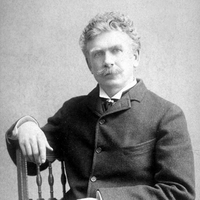Posterity’s Award
I’d long been dead, but I returned to earth.
Some small affairs posterity was making
A mess of, and I came to see that worth
Received its dues. I’d hardly finished waking,
The grave-mould still upon me, when my eye
Perceived a statue standing straight and high.
‘Twas a colossal figure-bronze and gold
Nobly designed, in attitude commanding.
A toga from its shoulders, fold on fold,
Fell to the pedestal on which ’twas standing.
Nobility it had and splendid grace,
And all it should have had-except a face!
It showed no features: not a trace nor sign
Of any eyes or nose could be detected
On the smooth oval of its front no line
Where sites for mouths are commonly selected.
All blank and blind its faulty head it reared.
Let this be said: ‘twas generously eared.
Seeing these things, I straight began to guess
For whom this mighty image was intended.
’The head,' I cried, 'is Upton’s, and the dress
Is Parson Bartlett’s own.' True, _his_ cloak ended
Flush with his lowest vertebra, but no
Sane sculptor ever made a toga so.
Then on the pedestal these words I read:
'_Erected Eighteen Hundred Ninety-seven_'
(Saint Christofer! how fast the time had sped!
Of course it naturally does in Heaven)
'_To_—' (here a blank space for the name began)
'_The Nineteenth Century’s Great Foremost Man_!'
'_Completed_' the inscription ended, '_in
The Year Three Thousand_'-which was just arriving.
By Jove! thought I, 'twould make the founders grin
To learn whose fame so long has been surviving
To read the name posterity will place
In that blank void, and view the finished face.
Even as I gazed, the year Three Thousand came,
And then by acclamation all the people
Decreed whose was our century’s best fame;
Then scaffolded the statue like a steeple,
To make the likeness; and the name was sunk
Deep in the pedestal’s metallic trunk.
Whose was it? Gentle reader, pray excuse
The seeming rudeness, but I can’t consent to
Be so forehanded with important news.
'Twas neither yours nor mine-let that content you.
If not, the name I must surrender, which,
Upon a dead man’s word, was George K. Fitch!

